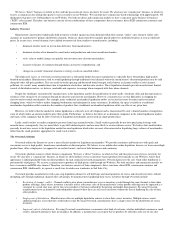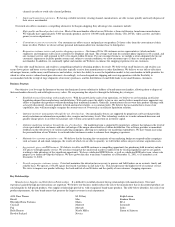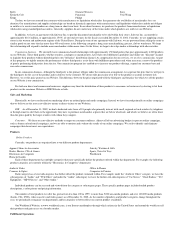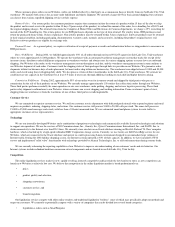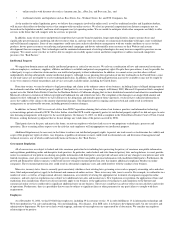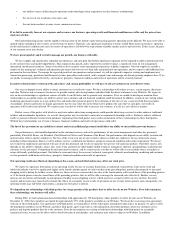Overstock.com 2002 Annual Report Download - page 15
Download and view the complete annual report
Please find page 15 of the 2002 Overstock.com annual report below. You can navigate through the pages in the report by either clicking on the pages listed below, or by using the keyword search tool below to find specific information within the annual report.
If third parties are able to penetrate our network security or otherwise misappropriate our customers' personal information or credit card information, or if
we give third parties improper access to our customers' personal information or credit card information, we could be subject to liability. This liability could
include claims for unauthorized purchases with credit card information, impersonation or other similar fraud claims. This liability could also include claims
for other misuses of personal information, including unauthorized marketing purposes. These claims could result in litigation. Liability for misappropriation
of this information could adversely affect our business. In addition, the Federal Trade Commission and state agencies have been investigating various Internet
companies regarding their use of personal information. We could incur additional expenses if new regulations regarding the use of personal information are
introduced or if government agencies investigate our privacy practices.
We rely on encryption and authentication technology licensed from third parties to provide the security and authentication necessary to effect secure
transmission of confidential information such as customer credit card numbers. We cannot assure you that advances in computer capabilities, new discoveries
in the field of cryptography or other events or developments will not result in a compromise or breach of the algorithms that we use to protect customer
transaction data. If any such compromise of our security were to occur, it could harm our reputation, business, prospects, financial condition and results of
operations. A party who is able to circumvent our security measures could misappropriate proprietary information or cause interruptions in our operations. We
may be required to expend significant capital and other resources to protect against such security breaches or to alleviate problems caused by such breaches.
We cannot assure you that our security measures will prevent security breaches or that failure to prevent such security breaches will not harm our business,
prospects, financial condition and results of operations.
We may expand our business internationally, causing our business to become increasingly susceptible to numerous international business risks and
challenges that could affect our profitability.
In the future, we may expand into international markets. International sales and transactions are subject to inherent risks and challenges that could
adversely affect our profitability, including:
the need to develop new supplier and manufacturer relationships;
unexpected changes in international regulatory requirements and tariffs;
difficulties in staffing and managing foreign operations;
longer payment cycles from credit card companies;
greater difficulty in accounts receivable collection;
potential adverse tax consequences;
price controls or other restrictions on foreign currency; and
difficulties in obtaining export and import licenses.
To the extent we generate international sales and transactions in the future, any negative impact on our international operations could negatively impact
our business. In particular, gains and losses on the conversion of foreign payments into United States dollars may contribute to fluctuations in our results of
operations and fluctuating exchange rates could cause reduced gross revenues and/or gross margins from non-dollar-denominated international sales.
We are subject to intellectual property litigation.
Third parties have, from time to time, claimed and may claim in the future that we have infringed their past, current or future intellectual property rights.
We may become more vulnerable to such claims as laws such as the Digital Millennium Copyright Act are interpreted by the courts. We may be increasingly
subject to infringement claims as the number of services and competitors in our segment grow.
In February 2002, Microsoft Corporation filed a complaint against us in the United States District Court for the Northern District of California alleging
that we have distributed counterfeit and otherwise unauthorized Microsoft software in violation of federal copyright and trademark law and related state laws.
The complaint seeks damages in an unspecified amount and injunctive relief. Although we believe we have defenses to the allegations and intend to pursue
them vigorously, we do not have sufficient information to assess the validity of the claims or the amount of potential damages. Although this litigation matter
is ongoing and unresolved it could result in settlement arrangements or an unfavorable outcome, including potential statutory damages.
In January 2003, we received a letter from NCR Corporation claiming that certain of our business practices and information technology systems infringe
patents owned by NCR. The letter further stated that NCR would vigorously protect its intellectual property rights if we did not agree to enter into licensing
arrangements with respect to the asserted patents. On January 31, 2003, we filed a complaint in the United States District Court of Utah, Central Division,
seeking declaratory judgment that we do not infringe any valid claim of the patents asserted by NCR. Resolving this and any other litigation or claims
regarding patents or other intellectual property, whether meritorious or not, could be costly, time-consuming, cause service delays, divert our management and
key personnel from our business operations, require expensive or unwanted changes in our methods of doing business or require us to enter into costly royalty
or licensing agreements, if available. As a result, these claims could harm our business.
We may be subject to product liability claims that could be costly and time consuming.
We sell products manufactured by third parties, some of which may be defective. If any product that we sell were to cause physical injury or injury to
property, the injured party or parties could bring claims against us as the retailer of the product. Our insurance coverage may not be adequate to cover every
claim that could be asserted. If a successful claim were brought against us in excess of our insurance coverage, it could adversely affect our business. Even
unsuccessful claims could result in the expenditure of funds and management time and could have a negative impact on our business.
•
•
•
•
•
•
•
•


